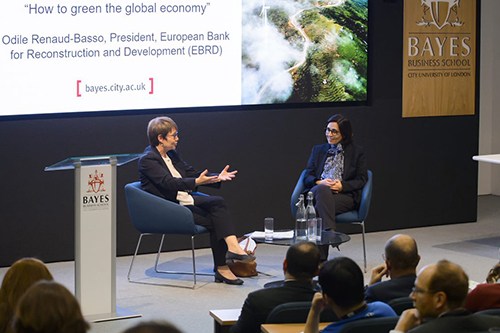EBRD President delivers Mais Lecture on greening the global economy
Rules governing economic markets need dramatic changes so that they can better deliver and accelerate the transition to a zero-carbon future, President Odile Renaud-Basso of the European Bank for Reconstruction and Development (EBRD) told an audience at Bayes Business School (formerly Cass) for the annual Mais Lecture.
Ms Renaud-Basso appealed to governments, investors, producers and consumers to assign more value to biodiversity and the ecosystem services and impose higher costs on pollution and carbon-intensive consumption.
“Addressing climate change and restoring nature are the defining challenges of our time,” she said.
“They are market failures of epic proportions that demand urgent and collective action.”
“We must seize these opportunities…because this is good business, because this is the right thing to do, and because we want a liveable planet for our children.”
The President of the London-based multilateral development bank, which invests across three continents, laid out a four-point plan covering the changes such a transformation would require.
“One, we must transition the energy system out of fossil fuels. Our use of coal, oil and gas is a recent innovation; it must also be a brief one.
“Two, we must reverse the tide of deforestation…. by preserving and protecting the remaining intact wild forests, including the Amazon and the Congo basin forests.
“Three, we must reshape agriculture…. for example by rapidly converting the nitrogen fertiliser industry to green ammonia, eating significantly less meat, transforming farming through sustainable intensification practices and precision agriculture, and addressing food loss and waste across the entire value chain.”
“Four, we must manage carbon. Even if we are successful in reducing emissions, we will still emit some CO2 and we will still have too much in the atmosphere.”

Ms Renaud-Basso’s address marked the first time the annual lecture has been devoted to the climate and nature crises since the series was launched in 1978. Previous speakers include, last year, Rishi Sunak, then UK Chancellor of the Exchequer, Annelise Dodds, Mark Carney, Paul Volcker, George Osborne, Alistair Darling, Valéry Giscard d’Estaing, Gordon Brown, Tony Blair, Nigel Lawson and Fredrick Hayek.
The EBRD is an acknowledged climate finance leader which last year, for the second year running, invested more than half its annual business volume in the green economy. As of the beginning of this year, the Bank has also fully aligned all its activities with the Paris Agreement.
In her lecture the President also listed four ways the private sector could help make the shift to a zero-carbon world:
Disclose – tell customers, employees, and shareholders about the climate-related risks they run and the impacts they cause.
Avoid – step away from unsustainable actions. Do not continue with practices or investments that are not consistent with a sustainable future.
Step up – invest and promote sustainable business activities.
Campaign – businesses have an interest in a well-functioning market so should be first to argue for a carbon price and for regulation of unsustainable practices.
Ms Renaud-Basso noted that two previous Mais lectures, those of Mr Sunak and the late Chief Rabbi Jonathan Sacks, had cited Adam Smith, the 18th century economist, and his belief in the power of sympathy for others as a driver of human action.
“We need a market, and financiers, that are efficient allocators of capital - but ones that also engage with the seriousness of the crisis unfolding around us and the human cost it exacts,” she said.
The EBRD is a multilateral bank that promotes the development of the private sector and entrepreneurial initiative in 36 economies across three continents. The Bank is owned by 71 countries as well as the EU and the EIB. EBRD investments are aimed at making the economies in its regions competitive, inclusive, well-governed, green, resilient and integrated.
